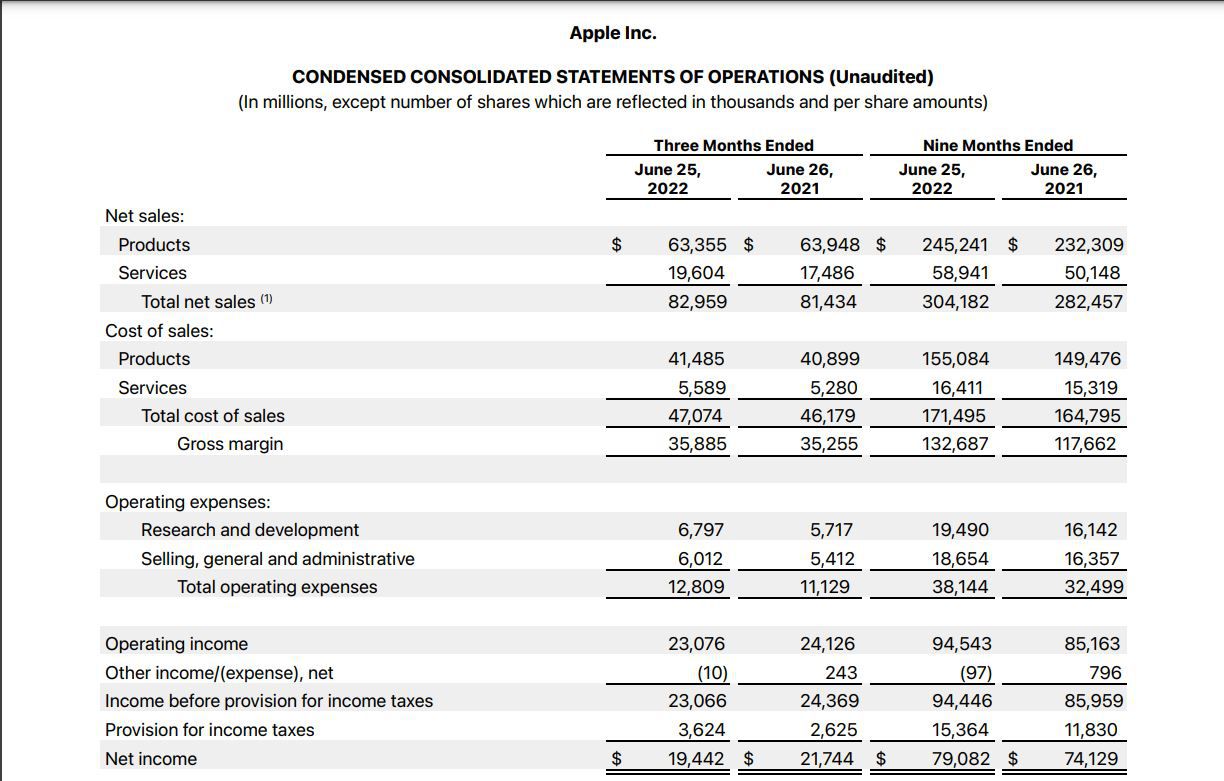

Finance
Why Outsource Accounting Services
Published: October 8, 2023
Looking to streamline your financial processes? Outsource accounting services to professionals who specialize in finance. Enhance efficiency and accuracy while saving time and resources.
(Many of the links in this article redirect to a specific reviewed product. Your purchase of these products through affiliate links helps to generate commission for LiveWell, at no extra cost. Learn more)
Table of Contents
- Introduction
- Benefits of Outsourcing Accounting Services
- Cost Savings
- Access to Expertise
- Focus on Core Business Functions
- Improved Efficiency and Accuracy
- Scalability and Flexibility
- Enhanced Data Security
- Regulatory Compliance
- Potential Challenges of Outsourcing Accounting Services
- Finding the Right Outsourcing Partner
- Communication and Language Barriers
- Time Zone Differences
- Loss of Control over Accounting Processes
- Conclusion
Introduction
Accounting is a vital aspect of any business, as it involves the recording, analysis, and reporting of financial transactions. However, many companies face challenges in managing their accounting processes effectively. This is where outsourcing accounting services can be a game-changer.
Outsourcing accounting services involves hiring a third-party provider to handle various accounting tasks, including bookkeeping, financial statement preparation, tax planning, and payroll administration. This strategic decision allows businesses to focus on their core competencies while entrusting their financial processes to professionals.
In recent years, outsourcing has become a prevalent practice in the business world, with many companies realizing the numerous benefits it offers. From cost savings to improved accuracy and scalability, outsourcing accounting services can transform the financial management of an organization.
This article will delve into the benefits of outsourcing accounting services and highlight potential challenges that businesses may encounter. By understanding both the advantages and the obstacles, businesses can make informed decisions when considering outsourcing their accounting operations.
Benefits of Outsourcing Accounting Services
Outsourcing accounting services provides several significant advantages for businesses, irrespective of their size or industry. Let’s explore some of the key benefits:
- Cost Savings: Outsourcing accounting services can significantly reduce costs associated with hiring and training in-house accounting staff. Businesses can save on salaries, benefits, office space, and technology infrastructure, as these expenses are covered by the outsourcing provider.
- Access to Expertise: By partnering with a reputable accounting outsourcing firm, businesses gain access to a highly skilled and experienced team of professionals. These experts are well-versed in the latest accounting regulations and best practices, ensuring accurate financial reporting and compliance.
- Focus on Core Business Functions: Accounting tasks can be complex and time-consuming, diverting valuable resources and attention away from core business operations. Outsourcing accounting services allows businesses to prioritize their primary objectives and strategic initiatives, leading to increased productivity and growth.
- Improved Efficiency and Accuracy: Outsourcing providers have streamlined processes and advanced accounting software to facilitate efficient and error-free financial management. By leveraging their expertise and technology, businesses can enjoy faster turnaround times, improved accuracy, and timely financial reporting.
- Scalability and Flexibility: As businesses expand, the accounting workload increases and becomes more complex. Outsourcing accounting services offer scalability, enabling businesses to adjust their accounting support as needed. This flexibility ensures that the company’s financial needs are met during periods of growth or economic fluctuations.
- Enhanced Data Security: Outsourcing accounting firms prioritize data security and invest in robust infrastructure and systems to protect sensitive financial information. This includes encryption, firewalls, data backups, and strict access controls. Outsourcing providers are well-equipped to handle data security challenges with vigilance and compliance.
- Regulatory Compliance: Accounting rules and regulations are constantly evolving, and non-compliance can lead to severe penalties and legal issues. Outsourcing firms are well-versed in the latest regulatory requirements and ensure that businesses stay compliant. They keep track of industry changes, update processes accordingly, and minimize the risk of compliance breaches.
By embracing the benefits of outsourcing accounting services, businesses can optimize their financial management, reduce costs, and gain a competitive edge in the market. However, it’s essential to be aware of potential challenges that may arise during the outsourcing process.
Cost Savings
One of the primary benefits of outsourcing accounting services is the potential for significant cost savings. By outsourcing, businesses can eliminate the need to hire and train in-house accounting staff, which can be a costly endeavor. Instead, they can leverage the expertise of an outsourced accounting team at a fraction of the cost.
Here are a few ways in which outsourcing accounting services can help businesses save money:
- Reduced Labor Costs: Hiring and maintaining an in-house accounting department can be expensive. Apart from employee salaries, businesses have to bear additional costs such as employee benefits, insurance, and retirement plans. By outsourcing, companies can avoid these expenses and pay only for the services they require.
- No Infrastructure Costs: Operating an in-house accounting department requires investment in office space, furniture, equipment, and accounting software. By outsourcing, businesses can avoid these capital expenditures and have access to the latest accounting tools and technologies without incurring additional costs.
- Elimination of Training Costs: Bringing new accounting staff up to speed requires time and financial investment. Training employees on accounting software, procedures, and compliance can be a considerable expense. With outsourcing, businesses can rely on a team of trained professionals who are already experts in their field.
- Reduced Overhead Costs: In addition to salaries and training, in-house accounting departments come with ongoing overhead costs such as office supplies, utilities, and maintenance. Outsourcing shifts this burden to the service provider, allowing businesses to focus their resources on core operations and revenue-generating activities.
Overall, outsourcing accounting services helps businesses optimize their financial resources and allocate funds to areas that have a direct impact on their growth and success. By partnering with an outsourced accounting provider, businesses can achieve cost savings without compromising on the quality and accuracy of their financial operations.
Access to Expertise
Outsourcing accounting services provides businesses with access to a team of highly skilled and experienced professionals. These experts possess in-depth knowledge of accounting practices, tax regulations, and financial reporting standards, ensuring accurate and compliant financial management.
Here are some of the key advantages of gaining access to expertise through outsourcing:
- Industry Knowledge: Accounting outsourcing firms specialize in serving clients from various industries. They have a deep understanding of the specific accounting requirements and challenges that businesses in these industries face. This industry expertise allows them to provide valuable insights and tailored solutions to clients.
- Stay Up-to-Date with Regulations: Accounting rules and regulations are constantly evolving, and businesses must keep up with the changes to remain compliant. Outsourcing providers dedicate time and resources to stay updated on the latest industry trends, tax laws, and financial reporting standards. They ensure that businesses remain compliant with these regulations, mitigating the risk of penalties or legal issues.
- Advanced Accounting Software: Outsourcing firms invest in the latest accounting software and technologies to streamline their processes. By outsourcing, businesses gain access to state-of-the-art accounting tools that they may not have the resources to invest in on their own. These software solutions improve efficiency, accuracy, and reporting capabilities, enhancing the overall financial management of the business.
- Focus on Core Competencies: By outsourcing accounting services, businesses can rely on the expertise of accounting professionals, allowing them to focus on their core competencies. This means that business owners and employees can dedicate their time and energy to driving growth, improving operations, and serving customers, confident that their financial functions are well taken care of.
Furthermore, outsourcing providers often have a diverse team of accounting professionals with different areas of specialization. Whether it’s bookkeeping, tax planning, auditing, or financial analysis, businesses can leverage the specific expertise of these professionals to optimize their financial processes.
Overall, outsourcing accounting services grants businesses access to a team of seasoned experts, enabling them to tap into industry knowledge, stay compliant with changing regulations, and leverage advanced accounting technologies. This access to expertise enhances the efficiency, accuracy, and strategic decision-making of businesses, leading to improved financial performance and long-term success.
Focus on Core Business Functions
Running a successful business involves juggling various tasks and responsibilities. When it comes to managing accounting functions, outsourcing provides a valuable solution that allows businesses to focus on their core competencies and strategic objectives.
Here are some key benefits of outsourcing accounting services to help businesses focus on their core business functions:
- Time and Resource Allocation: Accounting tasks can be complex and time-consuming. By outsourcing these functions, businesses can free up valuable time and resources that can be redirected towards core business functions. This allows business owners and employees to focus on activities that directly contribute to revenue generation, innovation, and customer satisfaction.
- Strategic Decision Making: Outsourcing accounting services provides businesses with accurate and timely financial data. This valuable information allows management to make informed strategic decisions and plan for the future. With financial matters taken care of by experts, business leaders can focus on analyzing performance, identifying growth opportunities, and setting long-term goals.
- Risk Management: Accounting tasks, such as tax planning and financial reporting, require specialized knowledge and expertise. Outsourcing these functions to professionals helps mitigate the risk of errors, omissions, and non-compliance. This allows businesses to operate with confidence, knowing that their financial management is in capable hands.
- Improved Efficiency: By entrusting accounting tasks to outsourcing providers, businesses can benefit from their streamlined processes and advanced technologies. These providers leverage automation tools and standardized workflows, resulting in increased efficiency and faster turnaround times. This efficiency translates into time and cost savings for the business.
Moreover, outsourcing accounting services can alleviate the stress and burden on business owners and employees who may not have the necessary accounting expertise. This enables them to focus on what they do best and perform their roles more effectively.
By leveraging the expertise and efficiency of outsourced accounting professionals, businesses can streamline their operations, drive growth, and gain a competitive edge in the market. Outsourcing accounting functions allows businesses to focus on what they do best, paving the way for sustainable success and continued expansion.
Improved Efficiency and Accuracy
Outsourcing accounting services can significantly enhance the efficiency and accuracy of financial processes for businesses. With experienced professionals and advanced technologies at their disposal, outsourcing providers can streamline operations and deliver accurate financial data in a timely manner.
Let’s explore some key ways in which outsourcing improves efficiency and accuracy:
- Specialized Expertise: Accounting outsourcing firms employ professionals who have specialized knowledge and experience in financial management. These experts are well-versed in accounting principles, regulations, and best practices. Their expertise ensures that financial processes are executed efficiently and accurately.
- Advanced Accounting Software: Outsourcing providers invest in cutting-edge accounting software that automates various manual tasks. This software not only improves accuracy but also increases efficiency by reducing the time required for data entry, reconciliation, and financial reporting.
- Standardized Workflows: Outsourcing providers have established standardized workflows and processes for accounting tasks. These workflows are designed to maximize efficiency and ensure consistency in financial management across different clients. By following these well-defined processes, outsourcing providers can complete tasks quickly and accurately.
- Timely Financial Reporting: Accurate and timely financial reporting is crucial for making informed business decisions. Outsourcing accounting services can ensure that financial statements, such as balance sheets, income statements, and cash flow statements, are prepared and delivered on time. This allows businesses to have a clear understanding of their financial health and make data-driven decisions.
- Error Reduction: Mistakes in financial management can have serious implications for a business. Outsourcing accounting services can significantly reduce the risk of errors and discrepancies. With their expertise and attention to detail, outsourcing providers perform thorough checks and balances to ensure accuracy in financial records.
- Increased Productivity: By outsourcing accounting services, businesses can free up their internal resources to focus on core business functions. This improved focus and productivity lead to better overall performance and growth. With accounting tasks offloaded to experts, employees can dedicate their time to tasks that directly contribute to the company’s success.
Overall, outsourcing accounting services brings efficiency and accuracy to financial processes. Through specialized expertise, advanced software, standardized workflows, and timely reporting, outsourcing providers streamline operations and reduce the risk of errors. This enables businesses to make informed decisions, streamline operations, and improve their overall financial performance.
Scalability and Flexibility
One of the notable benefits of outsourcing accounting services is the scalability and flexibility it offers to businesses. As companies grow and face changing financial needs, outsourcing allows them to seamlessly adapt their accounting support to meet these demands.
Here are some ways in which outsourcing accounting services provide businesses with scalability and flexibility:
- Scale Operations Efficiently: As businesses expand, their accounting workload typically increases. Outsourcing accounting services provide the capacity to handle the growing volume of transactions, financial reporting, and compliance requirements. The outsourcing provider can quickly scale their resources up or down to accommodate the changing needs of the business.
- Cost-Effective Solution: Scaling an in-house accounting department can be expensive and time-consuming. Hiring and training additional staff, investing in infrastructure and software licenses, and managing the associated overhead costs can strain the resources of a growing business. Outsourcing provides a cost-effective solution by allowing businesses to scale their accounting support without incurring significant expenses.
- Flexible Service Options: Outsourcing accounting services offer flexibility in terms of service options. Businesses can choose to outsource specific accounting functions, such as bookkeeping, tax preparation, or payroll processing, based on their unique needs. This flexibility enables businesses to tailor their accounting support to align with their specific requirements and budget.
- Expert Resources On-Demand: Outsourced accounting providers have a pool of skilled professionals who can be mobilized as needed. During busy periods or when faced with complex financial tasks, businesses can tap into this expertise without the need to hire and train additional staff internally. This on-demand access to expert resources ensures that the business has the necessary support during peak times.
- Keep Up with Market Fluctuations: Economic conditions and market fluctuations can impact a company’s accounting needs. By outsourcing accounting services, businesses can easily adjust their support as the market changes. Whether it’s scaling down during a period of financial constraints or expanding during a period of growth, outsourcing provides the flexibility needed to align with business conditions.
By leveraging the scalability and flexibility provided by outsourcing accounting services, businesses can adapt to changing circumstances and significantly reduce the administrative burden related to managing an in-house accounting department. This enables businesses to allocate resources more efficiently, focus on core operations, and maintain financial stability and growth.
Enhanced Data Security
Data security is a critical aspect of financial management, and outsourcing accounting services can provide enhanced protection for sensitive financial information. Outsourcing partners employ robust security measures to ensure the confidentiality, integrity, and availability of data.
Here are some ways in which outsourcing accounting services enhance data security:
- Secure Infrastructure: Reliable outsourcing providers have state-of-the-art infrastructure with advanced security measures in place. This includes firewalls, encryption protocols, intrusion detection systems, and regular system updates. These security measures protect against unauthorized access, data breaches, and cyber threats.
- Data Encryption: Outsourcing partners prioritize the encryption of data during transmission and storage. Encrypted data cannot be easily understood or accessed by unauthorized individuals. This ensures that sensitive financial information remains secure and protected, even in the event of a security breach.
- Access Controls: Outsourcing providers implement strict access controls to limit access to sensitive financial data. They assign user roles and access permissions based on the principle of least privilege, ensuring that only authorized individuals can access specific data. This helps prevent unauthorized modifications, accidental errors, or intentional data tampering.
- Security Audits and Compliance: Outsourcing partners undergo regular security audits to assess their systems, processes, and protocols. These audits ensure that the outsourcing provider is following industry best practices and complying with relevant data protection and privacy regulations. By working with a compliant outsourcing partner, businesses can have confidence in the security of their financial data.
- Data Backups and Disaster Recovery: Outsourcing providers have robust data backup and disaster recovery plans in place to safeguard against data loss. Regular and secure backups ensure that financial data can be restored in the event of a system failure, natural disaster, or any other unforeseen circumstances. This redundancy protects against the risk of data loss and ensures business continuity.
- Employee Training and Confidentiality: Outsourcing providers educate their employees on data security protocols and the importance of confidentiality. Employees are trained on handling sensitive financial information securely and are bound by confidentiality agreements. This ensures that data privacy is maintained throughout the outsourcing engagement.
By outsourcing accounting services, businesses can benefit from the expertise and resources of outsourcing providers in managing data security risks. These measures not only protect sensitive financial information but also give businesses peace of mind, knowing that their data is in capable hands.
It is essential for businesses to thoroughly evaluate the security protocols and compliance standards of potential outsourcing partners to ensure the protection of their financial data. By partnering with a reliable outsourcing provider, businesses can enhance data security and focus on their core operations without compromising the confidentiality and integrity of their financial information.
Regulatory Compliance
Compliance with regulatory requirements is crucial for businesses to operate legally and maintain their reputation. Outsourcing accounting services can help businesses stay compliant with relevant financial regulations, industry standards, and reporting requirements.
Here are some ways in which outsourcing accounting services support regulatory compliance:
- Knowledge of Regulations: Accounting outsourcing providers have a deep understanding of financial regulations specific to different industries and jurisdictions. They stay updated on the latest changes in regulations and ensure that businesses remain compliant with these requirements. This includes adhering to accounting standards, tax laws, and reporting guidelines.
- Accurate Financial Reporting: Outsourcing providers have the expertise to prepare accurate and timely financial reports that comply with regulatory standards. They ensure that financial statements, such as balance sheets and income statements, are prepared in accordance with the applicable accounting principles. This mitigates the risk of non-compliance and constitutes a reliable foundation for decision-making.
- Tax Compliance: Tax regulations are complex and subject to frequent changes. Outsourcing providers specialize in tax planning and preparation, ensuring businesses comply with tax laws and fulfill their tax obligations. This includes accurate and timely filing of tax returns, deductions, and credits, reducing the risk of tax penalties or audits.
- Internal Controls: Outsourcing providers establish robust internal controls to prevent fraudulent activities and non-compliance. These controls include segregation of duties, regular audits, and monitoring of financial transactions. The implementation of these internal controls ensures that businesses have proper checks and balances in place to safeguard against errors and irregularities.
- Audit Support: In the event of an audit, outsourcing accounting services providers can assist businesses by preparing necessary documentation, cooperating with auditors, and providing accurate and reliable financial records. Their experience in audits ensures that businesses are well-prepared and can navigate the audit process smoothly and efficiently.
- Awareness of Industry Regulations: Different industries have specific regulations that apply to their financial reporting and compliance. Outsourcing providers with industry-specific expertise understand these regulations and ensure that businesses stay in compliance. They keep abreast of industry changes and update accounting practices accordingly to meet the unique requirements of different industries.
By aligning with an experienced outsourcing provider, businesses can leverage their knowledge, experience, and proactive approach to regulatory compliance. This ensures that businesses stay on top of changing regulations, mitigate compliance risks, and maintain a strong reputation in their industry.
However, it is crucial for businesses to assess the outsourcing provider’s track record, certifications, and commitment to compliance to ensure they are partnering with a reliable and trustworthy provider. By outsourcing accounting services, businesses can focus on their core operations while entrusting their financial management to experts who understand and prioritize regulatory compliance.
Potential Challenges of Outsourcing Accounting Services
While outsourcing accounting services offers numerous benefits, businesses should also be aware of potential challenges that may arise during the outsourcing process. Understanding these challenges can help businesses mitigate risks and make informed decisions. Here are some potential challenges of outsourcing accounting services:
- Finding the Right Outsourcing Partner: Choosing the right outsourcing provider is crucial for a successful partnership. It can be challenging to find a provider that aligns with the business’s values, goals, and specific accounting needs. Thorough research, due diligence, and careful evaluation of potential outsourcing partners can help businesses overcome this challenge.
- Communication and Language Barriers: When outsourcing accounting services to a provider located in a different country or region, there may be communication challenges due to language barriers or cultural differences. Clear and effective communication is essential for accurate financial reporting and efficient collaboration. Businesses should establish open lines of communication and address potential language barriers upfront.
- Time Zone Differences: Outsourcing to a provider in a different time zone can cause delays in communication and responsiveness. It is important to establish a clear communication schedule that accommodates the time zone differences to ensure efficient collaboration and timely completion of tasks.
- Loss of Control over Accounting Processes: By outsourcing accounting services, businesses entrust their financial processes to an external provider. This can create concerns about losing control over certain aspects of the accounting operations. It is crucial to establish a strong partnership and maintain open lines of communication to ensure transparency and maintain control over critical accounting processes.
- Data Confidentiality and Security Risks: While outsourcing providers take robust measures to ensure data security, there is always a risk of data breaches or unauthorized access to sensitive financial information. Businesses should thoroughly assess the security protocols and data protection measures implemented by the outsourcing provider to mitigate these risks. Clear agreements regarding data confidentiality and protection should also be established.
- Regulatory Compliance: Outsourcing accounting services does not absolve businesses of their responsibility to comply with legal and regulatory requirements. Businesses must ensure that the outsourcing provider has a strong understanding of applicable regulations and is committed to maintaining compliance. Regular monitoring and audits can help mitigate compliance risks.
Despite these challenges, most can be addressed and mitigated with proper planning, communication, and a solid partnership between the business and the outsourcing provider. By carefully selecting the right outsourcing partner and maintaining strong communication and controls, businesses can overcome these challenges and reap the benefits of outsourcing accounting services.
Finding the Right Outsourcing Partner
Choosing the right outsourcing partner is essential for a successful collaboration when outsourcing accounting services. The outsourcing provider will play a crucial role in managing critical financial processes, so it’s vital to find a partner that aligns with the business’s unique needs and objectives. Here are some key considerations when searching for the right outsourcing partner:
- Experience and Expertise: Look for an outsourcing provider with a proven track record and extensive experience in handling accounting services. Assess their expertise in the specific areas relevant to the business, such as bookkeeping, tax preparation, or financial reporting. A provider with industry-specific knowledge can also add value by understanding the unique challenges and regulatory requirements of the business’s sector.
- Reputation and References: Research the reputation and credibility of potential outsourcing partners. Read client testimonials and seek references from their existing clients to gain insights into their service quality, reliability, and customer satisfaction. This information helps in evaluating the provider’s capability to deliver on their promises and meet the business’s specific needs.
- Security and Compliance: Data security and regulatory compliance are critical considerations. Evaluate the outsourcing provider’s data security protocols, certifications, and compliance with relevant regulations, such as GDPR or HIPAA. Ensure that they have robust measures in place to protect sensitive financial data and maintain confidentiality. A reliable provider should be transparent in sharing their security practices and demonstrate a commitment to compliance.
- Technology and Infrastructure: Assess the outsourcing provider’s technology infrastructure and the accounting software they use. Ensure that they have up-to-date systems and tools that align with the business’s requirements. Compatibility with the business’s existing systems or the ability to easily integrate with them is also important for seamless collaboration and data exchange.
- Communication and Collaboration: Effective communication and collaboration are vital for a successful outsourcing partnership. Evaluate the outsourcing provider’s ability to communicate clearly and promptly. Consider factors such as language proficiency, cultural compatibility, availability of support channels, and responsiveness. Clear and open lines of communication ensure that expectations are aligned and any issues or questions are addressed promptly.
- Scalability and Flexibility: Consider the outsourcing provider’s capacity to scale their services as the business grows. Assess their ability to handle increasing transaction volumes, support additional locations, or accommodate changes in the business’s accounting needs. The provider should be flexible enough to adapt to the evolving requirements of the business.
Conducting thorough research, requesting proposals, and engaging in detailed discussions with potential outsourcing partners are crucial steps in the selection process. By considering these factors and making a well-informed decision, businesses can find the right outsourcing partner to manage their accounting services effectively and contribute positively to their financial success.
Communication and Language Barriers
When outsourcing accounting services to a provider located in a different country or region, businesses may encounter communication challenges due to language barriers or cultural differences. Effective communication is crucial for accurate financial reporting, collaboration, and building a successful outsourcing partnership. Here are some strategies to overcome communication and language barriers:
- Clear and Concise Communication: Use clear and straightforward language when communicating with the outsourcing provider. Avoid complex jargon, acronyms, or industry-specific terms that may be difficult to understand. Keeping communication concise and to the point can help ensure clarity and avoid misunderstandings.
- Use of Translation Services: If there is a significant language barrier, consider using professional translation services to facilitate communication. Translation services can help overcome language challenges during interactions such as email exchanges, conference calls, or documentation review.
- Establish Communication Channels: Identify communication channels that work best for both parties. These may include video conferences, instant messaging platforms, or dedicated project management tools that facilitate real-time communication. Agree upon appropriate response times and establish regular communication schedules to ensure effective collaboration.
- Designate a Point of Contact: Assign a dedicated point of contact on both sides to facilitate communication between the business and the outsourcing provider. This person can serve as a liaison to coordinate discussions, clarify requirements, and address any language-related issues that may arise.
- Cultural Sensitivity and Understanding: Cultural differences can impact communication styles and expectations. Take the time to understand and respect the cultural norms and communication preferences of the outsourcing provider. This includes being mindful of different time zones, holidays, and business etiquettes that may influence communication dynamics.
- Building a Relationship: Invest time in building a strong relationship with the outsourcing provider. Regularly communicate and foster a collegial environment that encourages open discussion and feedback. This helps bridge any potential language or cultural gaps and enhances collaboration.
- Investing in Language Training: If the outsourcing partnership is long-term and language is consistently an obstacle, consider providing language training to team members involved in the communication process. This can help overcome language barriers and foster better understanding between both parties.
By being proactive in addressing communication and language barriers, businesses can establish effective lines of communication with their outsourcing partners and ensure smooth collaboration. It is important to be patient, understanding, and adaptable to create a positive and productive working relationship across languages and cultures.
Time Zone Differences
Time zone differences can pose a challenge when outsourcing accounting services, especially when the outsourcing provider is located in a different region or country. These differences can impact communication, collaboration, and the overall efficiency of the outsourcing relationship. Here are some strategies to navigate the challenges of time zone differences:
- Establish a Communication Schedule: Set clear expectations for when and how communication will take place. Determine overlapping working hours where both parties can be available for real-time discussions and decision-making. Establish regular communication times to address any pressing issues or questions that may arise.
- Utilize Asynchronous Communication: Take advantage of collaborative tools and platforms that allow for asynchronous communication. This enables team members from different time zones to communicate and contribute to ongoing projects without necessarily being available at the same time. This can include email, project management tools, or shared document platforms.
- Share and Update Information: Document and share important information, updates, and tasks through a centralized platform accessible to all team members. This helps ensure that everyone is aligned and has access to the latest information regardless of time zone differences.
- Plan Deadlines and Expectations: Be mindful of time zone differences when setting deadlines and expectations. Allow for reasonable timeframes for tasks and deliverables to account for potential delays caused by the time zone disparity. Establish early communication on potential issues or conflicts in meeting deadlines to find mutually acceptable solutions.
- Delegate Authority and Empower Teams: Empower team members in different time zones to make decisions and take appropriate actions when necessary. Delegate authority and ensure that there is a clear understanding of roles and responsibilities across the team. This allows for more autonomous work and reduces the need for constant communication across time zones.
- Overlapping Work Hours: If possible and practical, consider adjusting work schedules to accommodate overlapping work hours. This may involve flexible working arrangements or staggered shifts to ensure that some team members are available during shared working hours. This allows for real-time collaboration and faster response times.
- Workload Distribution: Distribute the workload among team members in different time zones strategically. This ensures that tasks are assigned appropriately, considering the availability of team members and the urgency of the work. By managing the workload effectively, it becomes easier to maintain a smooth workflow despite time zone differences.
By implementing these strategies, businesses can effectively manage time zone differences and ensure efficient collaboration with their outsourcing partners. Open communication, clear expectations, and effective use of collaborative tools are key to bridging the gap and ensuring successful outcomes, regardless of geographic time disparities.
Loss of Control over Accounting Processes
One of the potential challenges of outsourcing accounting services is the concern of losing control over critical accounting processes. Outsourcing involves entrusting financial operations and decision-making to an external entity, which can raise apprehensions about maintaining control over key aspects of accounting. Here are some strategies to address this challenge:
- Thorough Evaluation and Selection: Conduct a thorough evaluation of potential outsourcing partners to ensure their expertise, reliability, and alignment with your business goals and values. Seek references and verify their track record in delivering quality accounting services. A well-vetted outsourcing provider can provide reassurance and mitigate concerns regarding loss of control.
- Clearly Define Expectations: Clearly communicate your expectations and requirements to the outsourcing provider from the outset. Establish service level agreements (SLAs) that outline specific deliverables, quality standards, and timelines. By setting clear expectations, you can maintain a level of control over the outcomes while allowing the outsourcing provider to handle the operational aspects.
- Establish Key Performance Indicators (KPIs): Define key performance indicators linked to the outsourcing partnership. Monitor and assess these performance metrics to ensure that the outsourcing provider is meeting the agreed-upon standards. Regularly review the performance indicators to maintain control and make any necessary adjustments or improvements.
- Establish Open Communication Channels: Maintain open and frequent communication with the outsourcing provider to stay informed about ongoing activities and address any concerns or questions promptly. Regular check-ins, progress updates, and scheduled meetings provide an opportunity to align expectations, provide guidance, and address any issues that may arise.
- Document Standard Operating Procedures (SOPs): Develop and document standard operating procedures for critical accounting processes. SOPs help ensure consistency, provide guidance, and maintain control over key operational aspects. By documenting processes, you can establish clear guidelines and expectations for the outsourcing provider to follow.
- Regular Reporting and Audit: Request regular reporting from the outsourcing provider on financial activities, performance, and compliance. Review these reports carefully to maintain oversight and identify any potential red flags. Conduct periodic audits to verify the accuracy and integrity of the work carried out by the outsourcing partner.
- Gradual Transition and Collaboration: Consider a gradual transition when outsourcing accounting services. This approach allows for a more collaborative process, where the internal team and the outsourcing provider work together to ensure a smooth and seamless transition. Gradual handover of responsibilities can help address concerns and provide a sense of control during the outsourcing process.
- Continuous Monitoring and Improvement: Maintain active oversight and continuously monitor the performance of the outsourcing provider. Address any issues or areas for improvement proactively. Regularly review the outsourcing arrangement to ensure that it remains aligned with your business needs and that you maintain control over critical accounting processes.
By implementing these strategies, businesses can mitigate concerns over the loss of control when outsourcing accounting services. Transparent communication, setting clear expectations, and maintaining oversight through established processes and regular reporting allow businesses to maintain a level of control while benefiting from the expertise and efficiency of the outsourcing provider.
Conclusion
Outsourcing accounting services offers numerous benefits for businesses, allowing them to streamline their financial management, reduce costs, and access specialized expertise. By entrusting accounting tasks to an external provider, businesses can focus on their core competencies, drive growth, and make strategic decisions based on accurate and timely financial information.
Throughout this article, we have explored the benefits of outsourcing accounting services, including cost savings, access to expertise, improved efficiency and accuracy, scalability, and enhanced data security. However, it is important to be aware of potential challenges, such as finding the right outsourcing partner, communication and language barriers, time zone differences, loss of control over accounting processes, and data security risks.
To overcome these challenges, businesses should conduct thorough research, establish clear communication channels, clarify expectations, and maintain an open dialogue with the outsourcing provider. It is crucial to choose a reputable outsourcing partner with expertise in the industry, ensuring they align with the business’s values and compliance requirements.
Ultimately, outsourcing accounting services can be a strategic decision that empowers businesses to optimize their financial operations, adapt to changing needs, and remain compliant with regulations. With careful planning, effective communication, and a robust outsourcing partnership, businesses can realize the full potential of outsourcing to achieve financial success and focus on their core business functions.














